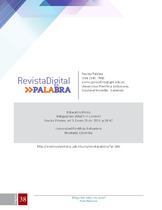| dc.contributor.author | Polovatina, Polina | |
| dc.coverage.spatial | Seccional Medellín | spa |
| dc.date.accessioned | 2020-11-28T01:50:47Z | |
| dc.date.available | 2020-11-28T01:50:47Z | |
| dc.date.issued | 2014 | |
| dc.identifier.uri | http://hdl.handle.net/20.500.11912/6750 | |
| dc.description | p. 38 - 47 | spa |
| dc.description.abstract | The article takes another look at the National Bilingualism Plan through a discussion of the popular terms such as bilingualism, language knowledge, and nation. I argue that they are becoming common knowledge and often replace terms of overlapping or completely different meanings. The article also demonstrates that the Plan creates a particular image of the nation and its place in the world. Consisting of various proposals, it fails to present a clear policy, which opens doors to often contradictory interpretations and therefore fears and resistance to it. While reconsidering the role of bilingualism in reshaping the society, I propose to focus on the process of learning and knowledge instead of language as such, and an individual instead of a group. | spa |
| dc.description.abstract | El artículo hace un repaso al Programa Nacional de Bilingüismo a través de la discusión de los términos tales como el bilingüismo, el conocimiento lingüístico y la nación. Yo sostengo que estos términos están siendo utilizados como conocimiento común y sustituyen a menudo términos con significados completamente diferentes. El Plan no presenta una política única. Esto crea múltiples interpretaciones, a menudo contradictorias y por lo tanto, los temores y la resistencia al programa y a la idea del bilingüismo. En mi discusión me enfoco en significado cognitivo y educativo del bilingüismo. Yo propongo que es más útil centrarse en el proceso de aprendizaje y en conocimiento en lugar del lenguaje como tal, y un individuo en lugar de un grupo. | spa |
| dc.format.mimetype | application/pdf | |
| dc.language.iso | eng | |
| dc.publisher | Universidad Pontificia Bolivariana | spa |
| dc.relation.ispartof | Revista Digital Palabra | spa |
| dc.rights | Attribution-NonCommercial-NoDerivatives 4.0 International | * |
| dc.rights.uri | http://creativecommons.org/licenses/by-nc-nd/4.0/ | * |
| dc.subject | Bilingualism | spa |
| dc.subject | Nationalism | spa |
| dc.subject | National Bilingualism Plan | spa |
| dc.subject | Empowerment | spa |
| dc.subject | Language | spa |
| dc.subject | Bilingüismo | spa |
| dc.subject | Programa Nacional de Bilingüismo | spa |
| dc.subject | Nacionalismo | spa |
| dc.subject | Empoderamiento | spa |
| dc.subject | Lenguaje | spa |
| dc.title | Bilingualism: What’s in a name? | spa |
| dc.type | article | spa |
| dc.rights.accessRights | openAccess | spa |
| dc.type.hasVersion | publishedVersion | spa |
| dc.description.sectional | Medellín | spa |
| dc.identifier.instname | instname:Universidad Pontificia Bolivariana | spa |
| dc.identifier.reponame | reponame:Repositorio Institucional de la Universidad Pontificia Bolivariana | spa |
| dc.identifier.repourl | repourl:https://repository.unab.edu.co/ | |


